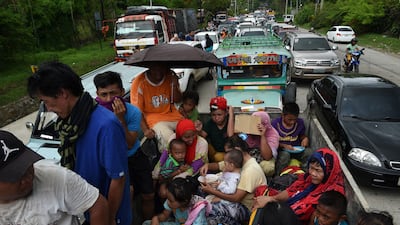MANILA // ISIL-inspired extremists abducted a Catholic priest and more than a dozen churchgoers while laying siege to a southern Philippine city overnight, burning buildings, ambushing soldiers and hoisting black ISIL flags, officials said on Wednesday.
The militants forced their way into a cathedral in Marawi and seized a priest, 10 worshippers and three church workers on Wednesday, said Archbishop Socrates Villegas, president of the Catholic Bishops Conference of the Philippines.
President Rodrigo Duterte said on Wednesday he may impose martial law throughout the nation, a day after declaring military rule in the southern region of Mindanao – home to about 20 million people – after militants who pledged allegiance to ISIL rampaged through the city of Marawi.
The violence erupted on Tuesday night after the army raided the hideout of Isnilon Hapilon, an Abu Sayyaf commander. Hapilon is on Washington’s list of most-wanted terrorists with a reward of up to US$5 million for his capture.
The militants called for reinforcements from an allied group, the Maute, and some 50 gunmen managed to enter the city of Marawi.
“We are in a state of emergency,” Mr Duterte said after landing in Manila from a visit to Moscow, adding that skirmishes were continuing. “I have a serious problem in Mindanao and the ISIL footprints are everywhere.”
He said he may declare martial law elsewhere in the Philippines if militants expand their attacks.
The kidnapped priest, Father Chito, and the others had no role in the conflict, Mr Villegas said.
“He was not a combatant. He was not bearing arms. He was a threat to none,” Mr Villegas said of Chito. “His capture and that of his companions violates every norm of civilised conflict.” Mr Villegas says the gunmen are demanding the government recall its forces.
Mr Duterte declared martial rule for 60 days in the entire Mindanao region. He had vowed to be “harsh”.
He said the militants in the southern city of Marawi beheaded a local police chief, justifying the imposition of martial law.
“The chief of police in Malabang on his way home, going back he was stopped by a checkpoint manned by terrorists and I think they decapitated them right then and there,” Mr Duterte said.
“I warned everybody not to force my hand into it,” Mr Duterte said on Wednesday. “I have to do it to preserve the republic.”
Martial law allows Mr Duterte to harness the armed forces to carry out arrests, searches and detentions more rapidly. He has repeatedly threatened to place the south, the scene of decades-long Muslim separatist uprisings, under martial law. But human rights groups have expressed fears that martial law powers could further embolden the president, whom they have accused of allowing extrajudicial killings of thousands of drug suspects in his war on drugs.
Details from inside Marawi were sketchy because the largely Muslim city of more than 200,000 people appeared to be largely sealed off and without electricity.
“The whole of Marawi city is blacked out, there is no light, and there are Maute snipers all around,” Delfin Lorenzana, the defence secretary said late Tuesday in Moscow.
Mr Lorenzana said dozens of gunmen occupied city hall, a hospital and a jail and burnt a Catholic church, a college and some houses in an assault that killed at least two soldiers and a police officer and wounded 12 others.
Hapilon, an Arabic-speaking Islamist preacher known for his expertise on commando assaults, pledged allegiance to ISIL in 2014. He is a commander of the Abu Sayyaf militant group and was wounded by a military air raid in January.
Troops sealed off major entry and exit points to prevent Hapilon from escaping, military chief of staff Gen Eduardo Ano said in Moscow.
“We will conduct house-to-house clearing and do everything to remove the threat there. We can do that easily,” Gen Ano said, but added it was more difficult in an urban setting because of the need to avoid civilian casualties.
He said the group hoisted ISIL flags at several locations.
Mr Duterte met Russian president Vladimir Putin late on Tuesday and said he is counting on Russia to supply weapons for the Philippines to fight terrorism.
“Of course, our country needs modern weapons, we had orders in the United States, but now the situation there is not very smooth and to fight ISIL, with their units and factions, we need modern weapons,” he said, according to Russian state news agency Tass.
While pursuing peace talks with two large Muslim rebel groups in the south of this predominantly Roman Catholic nation, Mr Duterte has ordered the military to destroy smaller extremist groups which have tried to align with ISIL.
The Maute group is one of a handful of new armed Muslim groups that have pledged allegiance to ISIL and formed a loose alliance with Hapilon reportedly designated as the alliance’s leader.
The Maute has been blamed for a bombing that killed 15 people in southern Davao city, Mr Duterte’s hometown, last September and a number of attacks on government forces in Lanao, although it has faced setbacks from a series of military offensives.
Last month, troops backed by air strikes killed dozens of Maute militants and captured their jungle camp near Lanao del Sur’s Piagapo town. Troops found homemade bombs, grenades, combat fatigues and passports of suspected Indonesian militants in the camp, the military said.
* Associated Press and Agence France-Presse

